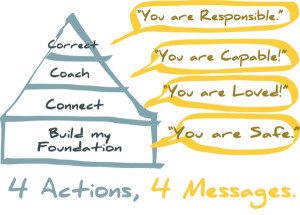Four Self-Image Messages That Fuel Performance
Self-image drives behavior. As Henry Ford once said, “Whether you think you can, or think you can’t—you’re right.” Leaders who promote a positive self-image in others maximize potential. Period.
The leaders I’ve followed in my life—managers, coaches, mentors, parents—have each communicated to me “messages” about who I am. Keep in mind, communicating a message isn’t just about the words spoken. The attitude and actions behind the words are far more potent than the actual words spoken.
For example, one leader continuously “told” me, in so many words: You are gifted. He did this both through words and by setting me up to use those gifts. Another leader sent me this message: You are conditionally valuable, depending on your project. That message came less through words and more through the attitude and actions he exhibited based on my project’s value to him. I don’t know if the messages I received from these leaders were intentional or not, but they both had a powerful effect.
My friend Jim Jackson and his wife Lynne are co-founders of Connected Families. My wife and I have found tremendous value in their guidance and model for parenting. The principles they teach apply to all leadership roles, though. In a recent conversation with Jim, we talked about how leaders impact the self-image of others through the messages they send. Jim reviewed this framework that they developed to help leaders consider these key messages.

Consider how well you communicate these four messages to others in your leadership roles.
- You are safe. I’ve previously written about the importance of feeling safe at work. Jim says leaders continuously send messages to others about how safe they are. Even the well-intended leader who blames, criticizes or expresses frustration in the name of efficiency may be unwittingly communicating “unsafety” to his or her team.
When you can be OK, even in the face of challenges, you send a message to the team, You are safe. - You are loved. We’re not talking here about affectionate love, but about true caring in the workplace. Jim says that when leaders truly care and express it in ways that land, the team will be eager to collaborate toward team goals.
So find ways to send the message, You are cared for here. One simple way is to ask, “How are you?” or even, “What’s up?” Give space for an honest answer, no matter how long it might be. Make good eye contact, and respond with empathy rather than a need to “fix.”
The more people get the message that they’re cared for, the more they’ll want to engage. - You are capable. Leaders often have the ability to see strengths, gifts and talents. They also see weaknesses, deficiencies and incompetence. Whichever perspective they dwell on will reinforce a message.
So if you notice a colleague’s talent, even in a small way, acknowledge it by affirming it. If the direct affirmation seems a bit contrived (”Great job making copies.”), try an indirect affirmation: “It’s great having everything so well prepped for a meeting like this.”
Affirming positive contributions breeds more of the same because people will receive the message, You are capable. - You are responsible. Jim explains that when people know they are safe, loved and capable, they are more courageous in embracing responsibility for successes as well as failures. Accountability drives action.
You communicate responsibility when you empower others to make right what they’ve made wrong and pose solutions to issues they face. The simplest script for communicating, You are responsible is this: “You’re facing quite a problem. Do you want help solving it, or do you want to take care of it yourself?” Then, as a follow up, “How would you like me to check in on it?” This lets people know that they’re responsible and accountable.
I realize that the “You are” messages I send come from the attitude I have toward others. Jim recently challenged me when he asked, “How are you cultivating an attitude toward others that prompts you to send the right ‘You are…’ messages?”
How about you? What “You are” messages do you want to be sure to communicate this week?









Comments are closed here.